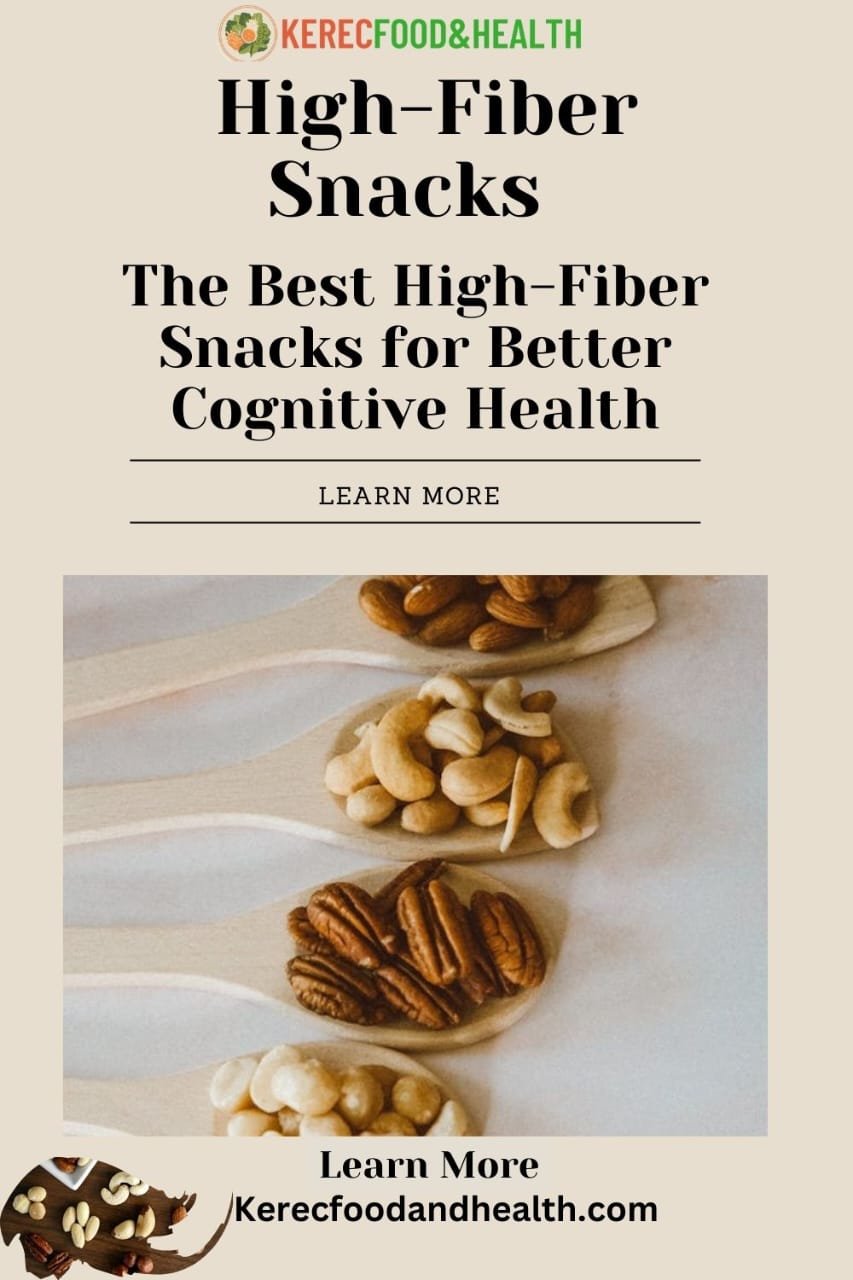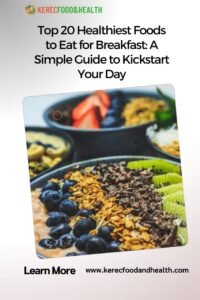In today’s fast-paced world, maintaining good cognitive health is essential for a productive and fulfilling life. Our brain plays a crucial role in our daily activities, from making decisions to remembering important information. However, one aspect that is often overlooked when it comes to brain health is our diet. In recent years, research has shown a strong link between our gut health and cognitive function. Specifically, the consumption of high-fiber snacks has been linked to better cognitive health. In this article, we will explore the best high-fiber snack for better cognitive health and why it should be a staple in your diet.
What is High-fiber Snacks?
First and foremost, let’s understand what high-fiber snacks are and why they are beneficial for our cognitive health. High-fiber snacks are typically foods that are rich in dietary fiber, which is a type of carbohydrate that our body cannot digest.
What Makes High-fiber Snacks Beneficial for our Cognitive Health?
These snacks are known to provide a range of health benefits, including improved digestion and heart health. Research suggests that fiber-rich foods can improve memory, reduce inflammation, and even lower the risk of cognitive decline. But what makes them particularly beneficial for our cognitive health? Let’s break it down.
1. Supports a Healthy Gut-Brain Connection
Did you know that your gut and brain are directly linked? A healthy gut microbiome produces neurotransmitters like serotonin and dopamine, which influence mood and cognitive function. Fiber acts as a prebiotic, feeding good gut bacteria and promoting a balanced microbiome. This, in turn, enhances brain health and reduces the risk of mental fog or mood swings. Studies have also shown that certain types of gut bacteria can produce short-chain fatty acids, which play a role in preserving brain function.
2. Reduces Inflammation in the Brain
Chronic inflammation is linked to cognitive decline, Alzheimer’s disease, and other neurological disorders. Fiber helps lower inflammation by promoting the production of short-chain fatty acids (SCFAs), which have anti-inflammatory properties. This can protect brain cells from damage and support long-term cognitive function.
3. Stabilizes Blood Sugar Levels
High-fiber foods slow down digestion, preventing rapid spikes and crashes in blood sugar. Since the brain relies on a steady supply of glucose for energy, fiber helps maintain stable blood sugar levels, reducing brain fatigue and improving focus.
4. Enhances Memory and Learning
Some studies suggest that fiber-rich diets can improve memory and learning abilities. Foods high in fiber, like whole grains, nuts, and legumes, contain essential nutrients such as B vitamins and antioxidants, which support neurotransmitter function and enhance cognitive performance.
5. Lowers the Risk of Cognitive Decline
A diet rich in fiber is associated with a lower risk of age-related cognitive decline. One study published in the Frontiers in Nutrition journal found that individuals who consumed more dietary fiber had better cognitive function as they aged.
Final Thoughts
Adding high-fiber snacks to your diet is a simple yet effective way to support cognitive health. By keeping your gut healthy, reducing inflammation, and stabilizing blood sugar levels, fiber helps keep your brain sharp and functioning at its best. So, next time you reach for a snack, make it fiber-rich—you’ll be doing your brain a favor!
Best High-Fiber Snacks for Better Cognitive Health
When it comes to brain health, what you eat plays a crucial role. High-fiber snacks not only support digestion but also enhance cognitive function by improving gut health, stabilizing blood sugar, and reducing inflammation. If you want to boost your fiber intake for better cognitive health, try these brain-friendly snacks:
1. Nuts
So, one of the best high-fiber snack for better cognitive health is nuts! Nuts are an excellent source of dietary fiber, healthy fats, and vitamin E, with almonds, pistachios, and walnuts being among the highest fiber-containing nuts. Omega-3 fatty acids in walnuts support cognitive function, while almonds help improve memory and learning. Eating a handful of nuts daily can help protect against age-related cognitive decline. In a study published in The Journal of Nutrition, Health & Aging, researchers found that consuming nuts regularly was associated with better cognitive performance in older adults. Another study published in the American Journal of Clinical Nutrition found that eating nuts as part of a healthy diet was associated with better cognitive function over time in women.
Why This Nuts Works:
Nuts are rich in fiber, healthy fats, protein, and various vitamins and minerals, making them a well-rounded and nutritious snack. Furthermore, the high levels of antioxidants in nuts have been linked to improved cognitive function and reduced risk of neurodegenerative diseases such as Alzheimer’s.
Aside from their impact on gut health, nuts also provide other benefits for our cognitive health. For instance, they contain essential fatty acids, such as omega-3s, which are crucial for brain function and development. These healthy fats have been linked to improved memory, focus, and overall brain health.
How to Enjoy
Here are some easy ways to add them to your daily meals:
1. Start Your Day with Nuts
- Sprinkle chopped almonds, walnuts, or pecans over your oatmeal or yogurt.
- Blend cashews or macadamia nuts into your smoothie for a creamy texture.
- Add crushed peanuts to your morning cereal for extra crunch.
2. Snack on Nuts
- Keep a small pack of mixed nuts in your bag or desk for a quick, healthy snack.
- Pair nuts with dried fruits like raisins or cranberries for a natural energy boost.
- Make your own trail mix by combining nuts, seeds, and dark chocolate chips.
3. Use Nuts in Cooking
- Toss cashews or peanuts into stir-fry dishes for added crunch and protein.
- Use ground almonds or walnuts as a coating for baked or grilled chicken and fish.
- Blend cashews into soups or sauces to create a creamy, dairy-free alternative.
4. Add Nuts to Salads
- Sprinkle toasted almonds or pecans over leafy greens for added texture.
- Mix walnuts into coleslaw or grain-based salads like quinoa or couscous.
- Crush pistachios and use them as a topping for roasted vegetables.
5. Bake with Nuts
- Fold chopped nuts into muffin or pancake batter for extra flavor.
- Add crushed nuts to homemade granola bars or energy bites.
- Make nut-based crusts for pies or cheesecakes.
6. Try Nut Butters
- Spread peanut, almond, or cashew butter on toast, crackers, or apple slices.
- Stir nut butter into oatmeal or yogurt for extra protein.
- Blend peanut butter into sauces for Asian-style dishes like satay or noodles.
7. Drink Your Nuts
- Make almond or cashew milk for a dairy-free alternative in coffee or smoothies.
- Blend nuts into protein shakes for a natural energy boost.
8. Portion Control Tips
While nuts are nutritious, they are also calorie-dense. Stick to a handful (about 1 ounce or 28 grams) per serving to get the benefits without overdoing it.
When it comes to improving our cognitive health, we cannot underestimate the importance of a healthy gut. And incorporating high-fiber snacks, specifically nuts, into our diet is a simple and effective way to boost gut health and ultimately support our brain function. So, next time you feel the need for a snack, reach for a handful of nuts and enjoy the tasty and beneficial boost it provides.
2. Kale & Banana Smoothie
Maintaining cognitive health is crucial as we age, and incorporating high-fiber snacks into our diet can play a significant role in supporting brain function. One standout option is the Kale & Banana Smoothie, which combines several brain-boosting ingredients.
Why This Smoothie Works:
Fiber: Fiber is not only beneficial for digestion but also supports cognitive functions such as processing speed and memory.
- Vitamin D: Found in both cow’s and fortified non-dairy milk, vitamin D plays a role in brain development, improving neuronal function, and regulating sleep patterns.
- Omega-3 Fatty Acids: Especially present in kale, omega-3s improve neurotransmitter functions and cognitive processes.
- Antioxidants & Flavonoids: Ingredients like honey, fruits, and vegetables reduce inflammation and oxidative stress, supporting overall brain health.
How to Enjoy:
- 1 cup of milk (dairy or fortified non-dairy)
- 1 ripe banana
- 1 cup of fresh kale leaves
- 1 tablespoon of honey
A handful of ice cubes
Blend all ingredients until smooth, and enjoy this nutrient-packed beverage as a snack or part of your breakfast routine.
Incorporating high-fiber snacks like this smoothie into your diet can be a delicious and effective way to support cognitive health. Remember, a balanced diet rich in nutrients, combined with regular physical activity and mental exercises, contributes to overall brain wellness.
3. Berries with Greek Yogurt
Berries, such as blueberries, strawberries, and raspberries, are packed with fiber and antioxidants like flavonoids, which help reduce oxidative stress and inflammation in the brain. Greek yogurt adds protein and probiotics, further supporting gut health, which is directly linked to cognitive function. This snack is a delicious way to keep your brain cells nourished and protected.
How to Enjoy:
Mix a handful of fresh or frozen berries into a bowl of Greek yogurt.
Drizzle with honey for natural sweetness.
Sprinkle some chia seeds or granola for extra fiber and crunch.
4. Oatmeal with Flaxseeds
Oatmeal is a fantastic high-fiber food that provides slow-releasing energy, helping to maintain focus and concentration throughout the day. Flaxseeds add an extra boost of fiber, omega-3 fatty acids, and lignans, which have anti-inflammatory properties beneficial for brain health.
How to Enjoy:
Cook oats with water or milk and stir in ground flaxseeds.
Add fruits like bananas or berries for natural sweetness.
Sprinkle cinnamon for added antioxidants and flavor.
5. Hummus with Whole-Grain Crackers
Hummus, made from fiber-rich chickpeas, provides plant-based protein, healthy fats, and brain-boosting minerals like magnesium and iron. Whole-grain crackers complement hummus by adding more fiber and complex carbohydrates, which support sustained energy and mental clarity.
How to Enjoy:
Dip whole-grain crackers or raw vegetables like carrots and bell peppers into hummus.
Spread hummus on whole-grain toast and top with avocado slices.
Use hummus as a base for wraps with lean protein and greens.
6. Dark Chocolate and Nuts
Dark chocolate contains flavonoids, caffeine, and antioxidants that improve blood flow to the brain, enhancing memory, focus, and mood. Pairing it with fiber-rich nuts like almonds or hazelnuts adds healthy fats and protein, making it a well-balanced, brain-boosting snack.
How to Enjoy:
Eat a small piece (70% or higher cocoa) with a handful of nuts.
Melt dark chocolate and drizzle over nuts and dried fruit for a homemade trail mix.
Mix dark chocolate chips into oatmeal or yogurt for a tasty, fiber-rich treat.
Final Thoughts
Incorporating high-fiber snacks into your diet is a simple yet powerful way to support cognitive health. These snacks help regulate blood sugar, improve gut health, and provide essential nutrients that nourish the brain. So, next time you need a quick bite, choose one of these fiber-packed options and fuel your brain for better focus, memory, and long-term cognitive wellness.
References:
1. De Filippo, C., Cavalieri, D., Di Paola, M., Ramazzotti, M., Poullet, J. B., Massart, S., Collini, S., Pieraccini, G., & Lionetti, P. (2010). Impact of diet in shaping gut microbiota revealed by a comparative study in children from Europe and rural Africa. Proceedings of the National Academy of Sciences of the United States of America, 107(33), 14691–14696. https://doi.org/10.1073/pnas.1005963107
2. Dalile, B., Van Oudenhove, L., Vervliet, B., Verbeke, K. (2019). The role of short-chain fatty acids in microbiota-gut-brain communication. Nature Reviews Gastroenterology & Hepatology, 16(8), 461–478. https://doi.org/10.1038/s41575-019-0174-6
3. Bitok, E., Sabaté, J., Carter, S. J., Fan, J., Beeson, W. L., & Fraser, G. E. (2019). Nut consumption and cognitive decline in older women. The American Journal of Clinical Nutrition, 109(5), 1402–1410. https://doi.org/10.1093/ajcn/nqz007
4. Kwon, Y. H. (2019). Nut consumption and risk of neurodegenerative diseases: A critical review. Nutrition Research and Practice, 13(5), 371–378. https://doi.org/10.4162/nrp.2019.13.5.371
5. O’Brien, J., Okereke, O., Devore, E., Rosner, B., Breteler, M., Grodstein, F. (2014). Long-term intake of nuts in relation to cognitive function in older women. The Journal of Nutrition, Health & Aging, 18(5), 496–502. https://doi.org/10.1007/s12603-014-0028-2
6. EatingWell. (2024). The Best High-Fiber Snack for Better Cognitive Health. Retrieved from https://www.eatingwell.com/best-high-fiber-snack-for-better-cognitive-health-8783613
7. Health.com. (2024). High-Fiber Snacks for Better Brain Health. Retrieved from https://www.health.com/high-fiber-snacks-8631111
8. Healthline. (2024). 22 High-Fiber Foods You Should Eat. Retrieved from https://www.healthline.com/nutrition/22-high-fiber-foods
9. Real Simple. (2024). Are Oats Good for You? Here’s What Nutritionists Say. Retrieved from https://www.realsimple.com/are-oats-good-for-you-8782060





